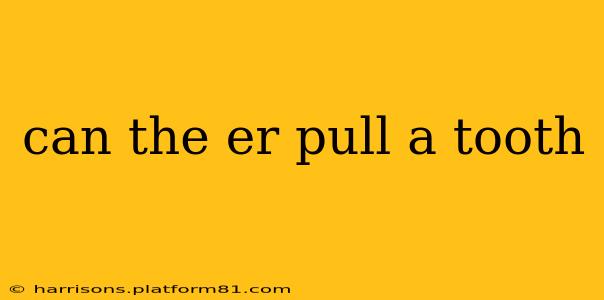Can an ER Pull a Tooth? Understanding Emergency Dental Care
The short answer is: sometimes, but usually not. While an Emergency Room (ER) is equipped to handle life-threatening situations, tooth extraction isn't typically one of them unless it's directly related to a more serious medical emergency.
Let's explore this further, addressing common questions surrounding emergency dental care in the ER.
What kind of dental emergencies would an ER handle?
An ER might intervene if a severely damaged tooth is causing a life-threatening complication. This could involve:
- Severe bleeding: Uncontrollable bleeding from a knocked-out or severely injured tooth that the ER staff cannot stop with standard first aid. They'll focus on controlling the bleeding, potentially requiring stitches or other interventions before referring you to a dentist.
- Infection spreading to other areas: A severe dental abscess that's causing a widespread infection (cellulitis) requiring antibiotics and potentially other medical interventions. The ER will address the immediate infection threat before referring you for dental treatment.
- Trauma-related injury: If a tooth injury is part of a more significant trauma (like a car accident), the ER will prioritize addressing the life-threatening injuries first. Dental care might be delayed until after the more urgent issues are dealt with.
- Tooth causing airway obstruction: In extremely rare cases, a severely loose or dislodged tooth might obstruct the airway, requiring immediate removal in the ER.
Why won't an ER usually pull a tooth?
ERs are designed for emergency medical care, not routine or elective dental procedures. Here's why they typically won't extract a tooth:
- Lack of specialized equipment and expertise: Dentists have specialized tools and training for efficient and safe tooth extractions. ERs are not equipped with this specialized equipment, and their staff are not trained in this procedure to the same level of skill and precision.
- Focus on life-threatening conditions: ERs prioritize treating conditions that immediately threaten life or limb. A simple toothache or even a loose tooth is generally not considered a life-threatening emergency.
- Risk of complications: Performing a tooth extraction improperly can lead to significant complications, including infections, excessive bleeding, and nerve damage. ER doctors would be hesitant to perform a procedure they're not fully equipped or trained for.
- Referral to appropriate care: The ER's role is to stabilize the patient and then refer them to a dentist or oral surgeon for appropriate dental care.
What should you do if you have a dental emergency?
If you have a dental emergency, your first step should be to contact a dentist or an emergency dental clinic. Many dental practices offer after-hours emergency services. If you cannot reach a dentist and your situation is life-threatening (as described above), then and only then should you go to the ER.
How can I prevent dental emergencies?
Regular dental checkups and good oral hygiene are your best defenses against dental emergencies. This includes brushing and flossing twice daily, using fluoride toothpaste, and maintaining a healthy diet. Addressing dental problems promptly, rather than waiting until they become emergencies, also significantly reduces the risk of severe complications.
In conclusion, while an ER might address a tooth-related issue if it's a component of a larger medical emergency, they are not a substitute for a dentist or oral surgeon when it comes to tooth extraction or other dental procedures. Always seek professional dental care for non-life-threatening dental issues.
